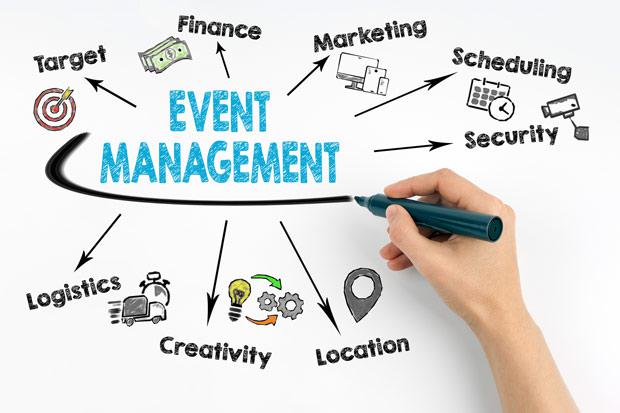How Charlotte Event Companies use event tech to improve guest engagement
Discover the Secrets to Effective Occasions Management Through Comprehensive Solutions Used
Successful events administration calls for a strategic method. It includes comprehending occasion objectives, choosing the ideal place, and reliable budgeting. Additionally, efficient advertising and marketing and smooth logistics play vital roles. Engaging attendees with interactive experiences can raise the total impact. However, examining success and Event feedback is similarly vital. Each facet interconnects to produce remarkable events. What are the crucial elements that really make an occasion stick out?
Comprehending Your Event Purposes
Plainly defining occasion goals is crucial for effective occasion administration. Establishing clear objectives gives a framework for all planning tasks and decision-making procedures. Occasion organizers have to determine the function of the event, whether it is to enlighten, commemorate, or promote a service or product. This understanding forms every element, from the target audience to the spending plan appropriation.
Furthermore, certain goals facilitate reliable communication among stakeholders, making certain that everybody is lined up in the direction of a typical vision. By verbalizing measurable results, planners can review success post-event, enabling for continuous renovation. Additionally, a well-defined unbiased assists in focusing on sources and tasks, streamlining initiatives towards achieving desired results. In general, recognizing event purposes is not simply a rule; it is a fundamental component that drives the success of any event, greatly influencing its total influence and effectiveness.
Choosing the Right Location for Your Event
Choosing the appropriate location is crucial for an event's success. Secret variables to take into account include the location's capability to suit visitors, its accessibility for attendees, and the general atmosphere that lines up with the occasion's motif. By meticulously assessing these aspects, occasion coordinators can develop a remarkable experience that meets their objectives.
Evaluating Location Ability Demands
Choosing the appropriate place for an occasion depends upon a detailed analysis of ability needs. Event organizers have to initially determine the expected variety of guests, as this considerably affects place option. A location that is as well little can lead to congestion, while one that is excessively large might lessen the event's atmosphere. Organizers need to likewise think about the type of occasion, as different gatherings call for different spatial setups, such as reception, cinema, or classroom arrangements. In addition, it is vital to account for extra space for staging, audio-visual tools, and catering services. By assessing these elements, occasion managers can guarantee that the picked location not only suits visitors comfortably however also boosts the general experience for every person involved.
Location Availability and Logistics
While the venue's capacity plays a vital function in occasion planning, its accessibility and logistics are similarly vital for guaranteeing an effective gathering. A well-chosen place needs to be easily reachable by different transport techniques, consisting of public transit, taxis, and auto parking facilities. This access allows attendees to show up without inconvenience, boosting their general experience. Furthermore, the venue's format ought to promote smooth activity, specifically for those with mobility challenges. Logistical considerations, such as setting up audio-visual devices and wedding catering solutions, need to additionally be factored in to stay clear of disturbances. Inevitably, focusing on access and logistics not just fosters a welcoming atmosphere but also contributes significantly to the event's success and attendees' contentment.
Ambiance and Aesthetic Appeal
The atmosphere and visual charm of a location play a crucial duty in establishing the tone for an occasion, affecting participants' feelings and total experience. An appropriate place boosts the thematic components of the celebration, whether it's a company celebration, wedding celebration, or social party. Variables such as style, format, and lights contribute greatly to creating a welcoming environment. For example, a historical structure may stimulate fond memories, while a modern area can inspire advancement. Furthermore, the location's environments, including sights and outside rooms, can additionally elevate the experience. Inevitably, selecting a place that aligns with the occasion's goals and wanted state of mind is necessary for successful events management, ensuring that visitors entrust to lasting perceptions and memories.

Budgeting: Allocating Resources Successfully
Effective budgeting is essential for effective occasion administration, as it guarantees that sources are designated in a way that makes best use of influence while reducing waste. Developing a detailed budget plan entails determining all potential expenses-- venue, food catering, home entertainment, and logistics-- to produce a reasonable economic framework. By reviewing the priorities and objectives of the occasion, managers can designate funds effectively, making sure critical elements obtain adequate investment.
Normal monitoring of expenditures throughout the preparation procedure is crucial to stay within spending plan and make necessary modifications. Making use of devices such as spread sheets or budgeting software program can improve this procedure, enabling real-time monitoring and projecting. Engaging in negotiations with vendors can lead to set you back financial savings without jeopardizing top quality. Ultimately, effective resource allowance via meticulous budgeting contributes to the general success of an event, producing unforgettable experiences while sticking to financial restraints.
:max_bytes(150000):strip_icc()/event-management-vs-event-planning-whats-the-difference-4022871-v3-5be9a8e146e0fb0051db23eb.png)
Marketing Your Event Effectively
Effective marketing is essential for the success of any type of occasion, beginning with the identification of the target audience. Using social media sites platforms enables wider reach and involvement, while developing compelling content captures rate of interest and motivates engagement. With each other, these approaches form a foundation for impactful event promotion.
Target Audience Identification

Social Network Promotion
Social media acts as an effective tool for event promo, allowing organizers to get to a substantial target market with minimal price. By leveraging systems such as Facebook, Twitter, Instagram, and LinkedIn, event supervisors can develop targeted campaigns that get in touch with potential participants. These platforms enable the sharing of occasion details, updates, and involving visuals, which can substantially boost visibility. Hashtags and collaborations with influencers better improve outreach efforts, attracting varied demographics. Additionally, social media sites promotes real-time communication, allowing organizers to reply to queries and feedback immediately. This prompt engagement promotes a feeling of area and expectancy bordering the occasion, ultimately adding to higher attendance rates and a successful event administration strategy.
Involving Content Production
Creating interesting content is essential for marketing an event efficiently, as it mesmerizes the target audience and motivates involvement. Quality check material can take different forms, consisting of blog site messages, videos, infographics, and social media updates. Each piece needs to convey the occasion's worth, highlighting essential audio speakers, activities, and one-of-a-kind experiences. Consistency throughout systems strengthens brand name acknowledgment and fosters target market trust fund.
Incorporating storytelling methods can stimulate feelings, making the occasion extra appealing and relatable. Using clear contact us to action motivates potential attendees to register or share information with others. Additionally, leveraging user-generated material, such as testimonies or pictures from previous events, can improve authenticity and produce a sense of neighborhood. Eventually, involving material is a cornerstone of successful occasion advertising approaches.
Logistics: Ensuring Smooth Workflow
Logistics is the foundation of effective event management, guaranteeing that every information straightens seamlessly to create a remarkable experience. This crucial facet includes various aspects, consisting of venue option, transport, equipment purchase, and on-site control. Effective logistics intending begins long prior to the event day, needing precise organizing and source allowance.
A well-organized logistical structure promotes smooth communication among suppliers, staff, and participants, decreasing prospective disruptions. This consists of managing timelines for arrangement, making sure that audiovisual devices is useful, and coordinating providing services. In addition, contingency strategies must be in area to deal with unforeseen scenarios, such as harsh climate or technical failings.
Engaging Participants Through Interactive Experiences
Just how can event organizers transform a standard Event right into an unforgettable experience? By integrating interactive aspects that involve attendees on several degrees. This might consist of hands-on workshops, live demonstrations, or immersive innovation such as online reality. These tasks not just boost rate of interest however also foster networking opportunities among individuals.
Organizers can use gamification strategies, where attendees contend in obstacles or quizzes associated with the occasion's try this website style. Such activities improve involvement and make the experience more memorable. In addition, including target market feedback systems permits real-time comments and interaction, which can make participants really feel extra spent in the occasion.
Producing areas for casual conversations, such as lounges or breakout areas, even more motivates interaction. By prioritizing these interactive experiences, event organizers can cultivate a dynamic ambience, ensuring attendees leave with valuable connections and lasting impressions, ultimately raising the general success of the event.
Examining Occasion Success and Event Comments
After promoting an interesting atmosphere via interactive experiences, reviewing the occasion's success comes to be essential. This procedure includes gathering measurable and qualitative data to analyze attendee complete satisfaction and total impact. Studies and feedback types are vital devices, allowing individuals to express their point of views on various elements, such as material relevance, audio speaker effectiveness, and logistical setups.

Evaluating presence metrics, interaction levels, and social media communications likewise provides crucial insights. This information allows occasion coordinators to recognize staminas and weaknesses, promoting notified choices for future events. In addition, follow-up meetings with key stakeholders can discover deeper viewpoints on the event's performance.
Eventually, gathering comments not only gauges success yet additionally cultivates a society of constant renovation. By prioritizing evaluation, event supervisors can enhance their methods, ensuring that each Event surpasses or fulfills individual expectations while accomplishing business goals. This commitment to representation strengthens the foundation for future successful events.
Regularly Asked Questions
What Are the Vital Abilities for an Event Manager?
Necessary abilities for an event manager include solid interaction, organizational capabilities, analytic aptitude, time administration, creative thinking, budgeting knowledge, leadership top qualities, and adaptability - Charlotte Event Companies. These skills make it possible for efficient control and implementation of effective occasions throughout different setups
How Can Technology Enhance Occasion Administration Solutions?
Modern technology improves occasion administration solutions by improving preparation processes, facilitating communication, automating tasks, and providing data analytics. These developments allow event managers to improve efficiency, engage participants, and develop tailored experiences, eventually leading to successful occasions.
What Licenses or authorizations Are Normally Required for Events?
Generally, occasions require licenses such as public setting up, alcohol licenses, health and wellness and security licenses, and noise authorizations. Needs vary by location, occasion kind, and size, demanding mindful planning to guarantee conformity with regional policies.
How Do You Take Care Of Unanticipated Obstacles During an Event?
To manage unanticipated difficulties throughout an occasion, effective coordinators keep adaptability, communicate swiftly with teams, and devise backup plans - Charlotte Event Companies. Quick problem-solving and versatility guarantee that disruptions are taken care of effectively, minimizing effect on the event's success
What Are the Finest Practices for Post-Event Follow-Up?
Post-event follow-up best techniques consist of sending out thank-you notes, gathering feedback through studies, evaluating occasion success metrics, and sharing highlights on social media sites. This strategy fosters partnerships and aids in the planning of future occasions.
Plainly specifying event purposes is important for successful event monitoring (Charlotte Event Companies). Event organizers should recognize the purpose of the occasion, whether it is to educate, celebrate, or advertise an item or service. Event organizers have to initially figure out the expected number of attendees, as this greatly affects location selection. Incorporating storytelling techniques can evoke feelings, making the occasion much more enticing and relatable. Usually, occasions need permits such as public assembly, alcohol licenses, health and wellness and safety and security authorizations, and noise permits